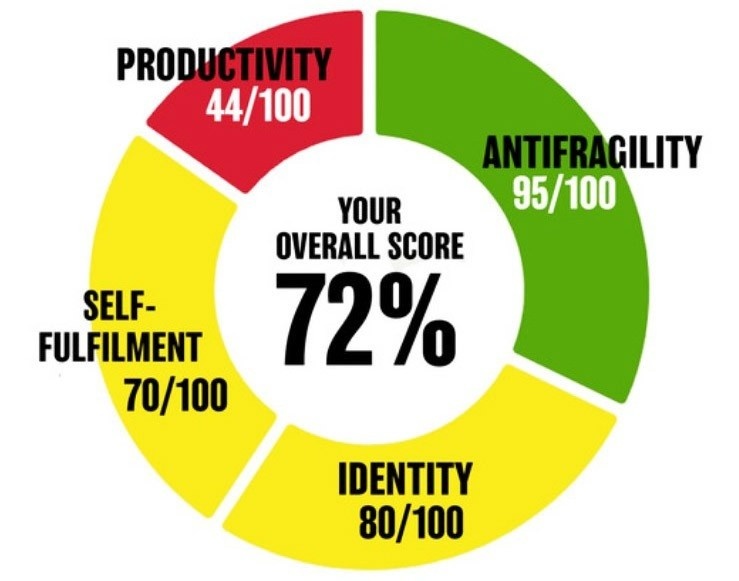SUMMARY
- Maximize The Value of Your Work – Remind yourself why it is that you are striving for your goals? Why is it important to you? And what are the benefits that you could be experiencing from doing the work?
- Maximize Expectancy – Maximize your belief in your ability to achieve what you are working on.
- Minimize Impulsivity – Minimize the likelihood distractions will occur by optimizing your environment.
- Minimize Delay – Minimize the amount of time it takes to gain that first taste of success! From your large overall goal create smaller goals to achieve along the way.
TRANSCRIPT
Everybody knows the importance of motivation, but few people realize that you can actually hack your motivation. And in the absence of not feeling motivated strongly enough, you won’t achieve whatever it is that you’re trying to do. You might quit too early or the journey might simply feel too frustrating. And none of that is what I want to happen to you. So stick around for today’s message because I’m going to be showing you how to scientifically hack your motivation so that you can carry through and do the things that you have set yourself to achieve.
My name is Eric Partaker, and I’m on a mission to help people reach their full potential in both business and life. And today, I’m going to be talking to you about the four different levers that you can pull to hack your motivation, to stay motivated, to get the job done, to complete the goal, to complete whatever it is that you are trying to achieve.
So, the first thing that you need to do is to maximize the value of whatever it is that you’re trying to work on. So what do I mean by that? You need to be reminding yourself, why is it that I’m doing this? Why is this important to me? What are the benefits that I could be experiencing for both myself, for others? And perhaps, looking at, well, are there other examples around me of people who have also achieved something valuable with this goal? All of that can be sources of fuel for your motivation. All of that could be sources of fuel to really maximize the value. And that’s what we’re trying to do, is make whatever it is that you’re doing feel as valuable as possible. So once again, asking yourself, why am I doing that? What are the benefits that I could be receiving? What benefits could this create for others? And then last but not least, looking around and seeing, well, have other people also pursued this goal? And what benefits did they receive? How was it valuable to them?
Number two, the next thing that you can be doing to maximize your motivation is to maximize what’s called Expectancy. And what expectancy simply is, is your belief in your ability to achieve whatever it is that you’re trying to work on. Now, there’s multiple ways that we can increase our expectancy. All of them center around self-belief. So, a simple exercise that you can do is, look back in your past, look back in your own timeline, and look back at similar, perhaps projects or activities or things that you’ve worked on with similar levels of difficulty or maybe in the same industry or in the same field and ask yourself, or just remember, recall your ability to complete that task at that time. Obviously, you had done it in the past. So therefore, you can do it again in the future.
And you don’t need to be just drawing on directly relevant experiences because some of the times when we are lacking motivation, it’s because we’re actually trying to do something that we’ve never tried before. At least that’s what we think that we’ve never tried before. But once again, if you go back in your own timeline, I’m sure you can think of similar events, similar situations, similar projects that have some kind of relationship to what you’re working on now where you stayed motivated, you completed a task. And that right there can be a source of motivation for your continued journey on whatever the project is that you’re trying to work on at the moment.
The other thing that we can be doing to increase expectancies to look at other people who have achieved whatever it is that we’re working on. So similar to, as I was saying with value, when you look at what other people have achieved, you can see from their vantage point, why was that valuable for them? And that also can drive or inform why this project or whatever it is that you’re working on can be valuable for you. It’s the same for expectancy. If you can look at other people who have achieved a similar result or perhaps have been in a similar situation as you, that right there can be a source of motivation because if they’ve done it, then you can do it as well. And there’s loads of examples of people who have gone before you very rarely.
I can’t even think of anything personally in my own life that anything that I worked on or achieved that somebody hadn’t achieved before. Virtually everything has been done in this world. And if you think about it in that way, and if you think about other people who have done something similar to what you’re doing, that right there can be a source of expectancy. It’s not the first time it’s been done. You can do it. And you can draw on the fact that others have gone before you as a source of fuel for your own expectancy.
So quick recap. Where are we so far in the motivation equation? We’ve talked about maximizing the value, V for value, and we’ve talked about maximizing your expectancy. So value is once again, why is that valuable for you? Expectancy is your belief that you can do it. Now, there’s also two things that we need to minimize to hack our motivation. And we need to minimize our impulsivity and our delay. So what are these two things? So, impulsivity is simply your likelihood of being distracted when it comes to working on whatever this project is or this task is, whatever it is that you’re trying to stay motivated on. And we need to minimize our impulsivity. We need to minimize our likelihood that we’re going to be distracted and start to divide our attention or lose our focus on whatever it is that we’re working on.
How do we minimize our impulsivity several ways? One is to optimize our environment. How do we optimize our environment? Well, we do that by removing anything in our environment that can be a source of distraction. Anything that can make us impulsive in nature. So, a key thing in that department would be our phones. Our smartphones. Any kind of device like that is very likely to prompt you to want to check. It could very well be a source of distraction. You could get a notification on the device. You could… The phone could suddenly ring for example. So if you really want to stay motivated and minimize your impulsivity, minimize your likelihood of being distracted. Definitely have devices out of the room or out of sight when you’re working on whatever that project is where your motivation needs to remain super high.
The other thing that you can do to minimize your impulsivity is just to make sure that you’re working on the project at the right time of day. So what do I mean by that? Well, when we’re worn out or when we’re fatigued or hungry, for example, all of those things could lead to us feeling a little bit more impulsive in nature, a little bit more likely to want to engage in distracting behavior or to start check things on social media, et cetera. So what we want to do is, once again, make sure that we’re optimizing our environment. Any needed devices, phones, they’re out of sight. And also make sure that our energy is at the right level… Better to be working on something, for example, that you want to stay highly motivated earlier in the day when your energy is higher rather than later in the day.
The number four, the number four thing that you need to do to scientifically hack your motivation is to minimize delay. So two things, once again, that we’re trying to minimize our impulsivity and our delay, how do we minimize delay? Well, what does that even mean, minimize delay? That simply means that we want to minimize the amount of time that it takes for us to get that first taste of success. So how do we do that? Well, one is to have clarity on whatever it is that we’re trying to achieve. But even more importantly, to chunk it down so that we get that first taste of success sooner rather than later. It’s very difficult to stay motivated on something. If whatever it is that you’re trying to work on, if that first taste of success is going to be a year or more in the future, well, then it’s hard to stay positive on that task. It’s hard for us to stay motivated to want to continue on. So we minimize delay by chunking things down.
So never let yourself have a goal, for example, that’s going to take three months for you to first achieve success. Think, well, how do I within a quarter, so a quarters consists of 13 weeks. 13 times four, that’s 52 weeks in a year. A quarter is 13 weeks. A lot of people think it’s 12, but we would lose four weeks in the year if it’s a 12 weeks per quarter. So 13 weeks in a quarter. And what we can do with a goal then if we want to achieve something in a quarter is, we could think of, for example, what are the 13 stepping points to get to that goal? What are the 13 things that I could do in sequence such that by doing them I would achieve whatever it is that I’ve set my mind to achieve? If 13 weeks is splicing it up too much, well, then how about every two weeks? How could I break that down? Or once a month. So suddenly a goal that you have for the quarter suddenly becomes three subgoals that you’re trying to achieve.
And by minimizing the delay, by minimizing the time that it’s going to take for us to experience that success, we are more likely, scientifically validated, more likely to stay motivated for the task at hand. The simplest way to do this is right at the start of a project. Well, two ways actually. So one could be right at the start of the project, and if your motivation is starting to wane during a project. Or a project or whatever it is that you’re working on, however you want call it.
So, right at the start of a project, you can ask yourself, how am I going to maximize the value and the expectancy and how am I going to minimize the impulsivity and the delay, right at the start? So think to yourself, why is this important? What benefits is it going to create for me and for others?have others achieve similar benefits? Also in the expectancy side of things, have I done something similar to this level of difficulty or similar nature to this project in the past? Have other people also done something like this before me? Am I not the first to have tried this? So, maximizing your value and expectancy. And then once again, minimizing your impulsivity and delay. What can I do to optimize my environment, optimize my energy so that I’m less likely to be distracted? And then on the delay side of things, how can I chunk that goal down so that I can get a first taste of success sooner rather than later?
If, while you’re working on a project or an activity or something where you want to keep your motivation high, if all of a sudden you feel that your motivation is starting to wane, well, you can look at that equation once again. Is that your value is not clear perhaps? Is your self-belief, your expectancy not clear? What can you do to increase both of those? Or, is perhaps the delay time too high? Is that first taste of success too far off in the future? What can you do to chunk it down, bring a little bit closer? Impulsivity, do you find yourself that you’re constantly not focused on the task at hand, that you’re jumping around working on lots of different things? Well, once again, well, what can you be doing to minimize that? How can you optimize your environment, optimize your energy so that you’re going to minimize your impulsivity?
So in summary, you want to increase your motivation? Take this science-backed equation to do it. It will do the work for you as long as you spend your time working in it. Maximize your value and your expectancy, minimize your impulsivity and delay, and you’ll find yourself being much more motivated for whatever it is that you’re trying to achieve in life. And if your motivation remains high in life, you’ll achieve so much more. So I hope you’ve enjoyed that. And if you head over to my website at ericpartaker.com, you can also subscribe to my Weekly Peak Performance Insights Newsletter.




